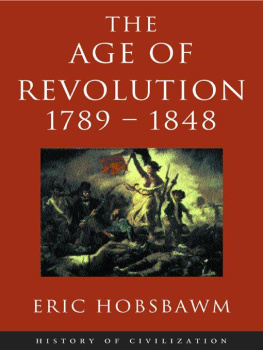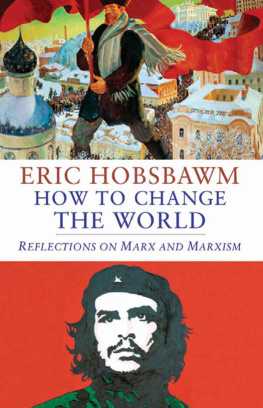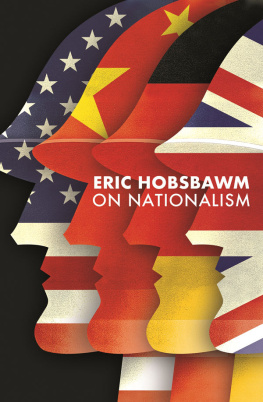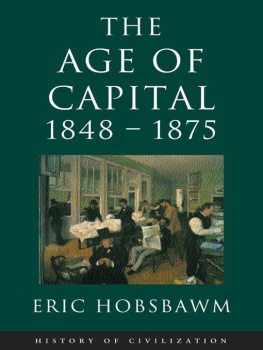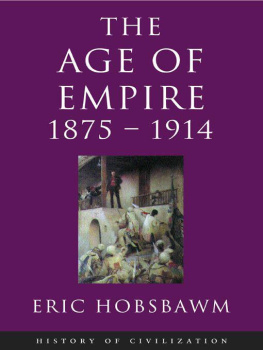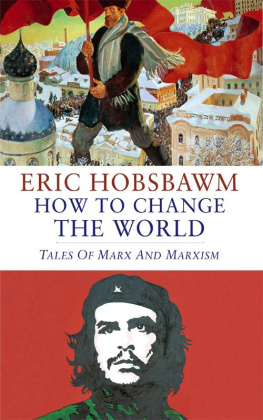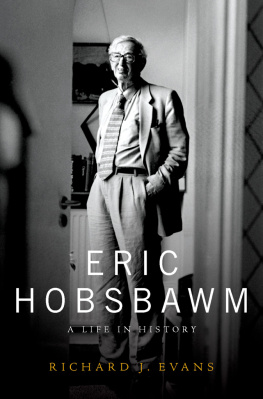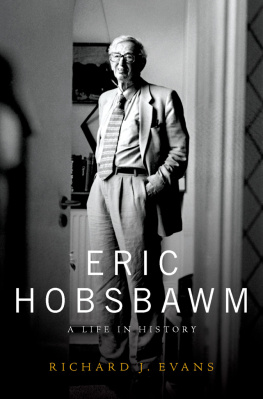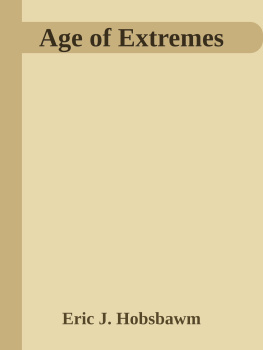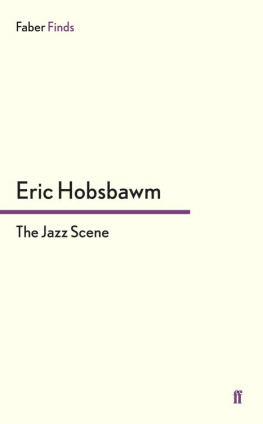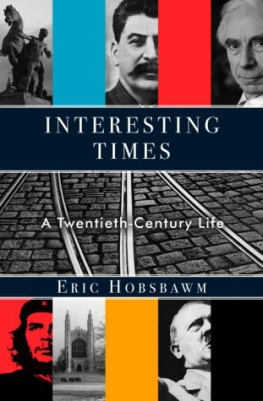Eric Hobsbawm - On History
Here you can read online Eric Hobsbawm - On History full text of the book (entire story) in english for free. Download pdf and epub, get meaning, cover and reviews about this ebook. year: 2011, publisher: Orion, genre: Politics. Description of the work, (preface) as well as reviews are available. Best literature library LitArk.com created for fans of good reading and offers a wide selection of genres:
Romance novel
Science fiction
Adventure
Detective
Science
History
Home and family
Prose
Art
Politics
Computer
Non-fiction
Religion
Business
Children
Humor
Choose a favorite category and find really read worthwhile books. Enjoy immersion in the world of imagination, feel the emotions of the characters or learn something new for yourself, make an fascinating discovery.

- Book:On History
- Author:
- Publisher:Orion
- Genre:
- Year:2011
- Rating:3 / 5
- Favourites:Add to favourites
- Your mark:
- 60
- 1
- 2
- 3
- 4
- 5
On History: summary, description and annotation
We offer to read an annotation, description, summary or preface (depends on what the author of the book "On History" wrote himself). If you haven't found the necessary information about the book — write in the comments, we will try to find it.
On History — read online for free the complete book (whole text) full work
Below is the text of the book, divided by pages. System saving the place of the last page read, allows you to conveniently read the book "On History" online for free, without having to search again every time where you left off. Put a bookmark, and you can go to the page where you finished reading at any time.
Font size:
Interval:
Bookmark:
Eric Hobsbawm was born in Alexandria in 1917 and educated in Vienna, Berlin, London and Cambridge. A Fellow of the British Academy and the American Academy of Arts and Sciences, with honorary degrees from universities in several countries, he taught until retirement at Birkbeck College, University of London, and since then at the New York School for Social Research in New York.
The Age of Capital 18481875
The Age of Empire 18751914
The Age of Extremes 19141991
Labouring Men
Industry and Empire
Bandits
Revolutionaries
Worlds of Labour
Nations and Nationalism Since 1780
Uncommon People
The New Century
Globalisation, Democracy and Terrorism
Eric Hobsbawm

The least philosophically minded historians can hardly avoid general reflections about their subject. Even when they can, they may not be encouraged to do so, for the demand for lectures and symposia, which tends to increase as a historian gets older, is more easily met by generalities than by actual research. In any case the contemporary slant of interest is towards conceptual and methodological questions of history. Theoreticians of all kinds circle round the peaceful herds of historians as they graze on the rich pastures of their primary sources or chew the cud of each others publications. Sometimes even the least combative feel impelled to face their attackers. Not that historians, the present author among them, are uncombative, at least when dealing with each others writings. Some of the most spectacular academic controversies have been fought on their fields of battle. So it is not surprising that someone who has been in the business for fifty years should in the course of time have produced the reflections on his subject which are now brought together in this collection of papers.
Short and unsystematic though several of them are in most of them the limits of what can be said in a fifty-minute lecture show, through they are nevertheless an attempt to grapple with a coherent set of problems. These are of three overlapping kinds. First, I am concerned with the uses, and abuses, of history in both society and politics, and with the understanding and, I hope, reshaping of the world. More specifically I discuss its value for other disciplines, especially in the social sciences. To this extent these papers are, if you like, advertisements for my trade. Second, they are about what has been happening among historians and other scholarly enquirers into the past. They include both surveys and critical assessments of various historical trends and fashions and interventions in debates, for instance, about postmodernism and cliometrics. Third, they are about my own kind of history, that is to say about the central problems which all serious historians ought to confront, about the historical interpretation I have found most useful when doing so, and also about the ways in which the history I have written bears the marks of a man of my age, background, beliefs and life-experience. Readers will probably find that every paper is in one way or another relevant to all of them.
My views on all these matters should be clear from the text. Nevertheless, I want to add a word or two of clarification on two themes of this book.
First, about telling the truth about history, to use the title of a book by friends and colleagues of the author. I strongly defend the view that what historians investigate is real. The point from which historians must start, however far from it they may end, is the fundamental and, for them, absolutely central distinction between establishable fact and fiction, between historical statements based on evidence and subject to evidence and those which are not.
It has become fashionable in recent decades, not least among people who think of themselves as on the left, to deny that objective reality is accessible, since what we call facts exist only as a function of prior concepts and problems formulated in terms of these. The past we study is only a construct of our minds. One such construct is in principle as valid as another, whether it can be backed by logic and evidence or not. So long as it forms part of an emotionally strong system of beliefs, there is, as it were, no way in principle of deciding that the biblical account of the creation of the earth is inferior to the one proposed by the natural sciences: they are just different. Any tendency to doubt this is positivism, and no term indicates a more comprehensive dismissal than this, unless it is empiricism.
In short, I believe that without the distinction between what is and what is not so, there can be no history. Rome defeated and destroyed Carthage in the Punic Wars, not the other way round. How we assemble and interpret our chosen sample of verifiable data (which may include not only what happened but what people thought about it) is another matter.
Actually, few relativists have the full courage of their convictions, at least when it comes to deciding such questions as whether Hitlers Holocaust took place or not. However, in any case, relativism will not do in history any more than in law courts. Whether the accused in a murder trial is or is not guilty depends on the assessment of old-fashioned positivist evidence, if such evidence is available. Any innocent readers who find themselves in the dock will do well to appeal to it. It is the lawyers for the guilty ones who fall back on postmodern lines of defence.
Second, about the Marxist approach to history with which I am associated. Though it is imprecise, I do not disclaim the label. Without Marx I would not have developed any special interest in history, which, as taught in the first half of the 1930s in a conservative German Gymnasium and by an admirable Liberal master in a London grammar school, was not an inspiring subject. I would almost certainly not have come to earn my living as a professional academic historian. Marx, and the fields of activity of young Marxist radicals, gave me my subjects of research and inspired the way I wrote about them. Even if I thought large parts of Marxs approach to history needed junking, I would still continue to pay my respects, profound though not uncritical, to what the Japanese call a sensei, an intellectual master to whom one owes a debt that cannot be repaid. As it happens, I continue (with qualifications to be found in these papers) to find Marxs materialist conception of history the best guide by far to history, as the great fourteenth-century scholar Ibn Khaldun described it, namely as:
the record of human society, or world civilization; of the changes that take place in the nature of that society...; of revolutions and uprisings by one set of people against another, with the resulting kingdoms and states with their various ranks; of the different activities and occupations of men, whether for gaining their livelihood or in various sciences and crafts; and in general, of all the transformations that society undergoes by its very nature.
It is certainly the best guide to those like myself whose field has been the rise of modern capitalism and the transformations of the world since the end of the European Middle Ages.
But what exactly is a Marxist historian as distinct from a non-Marxist historian? Ideologists on both sides of the secular wars of religion through which we have lived for much of this century have attempted to establish neat dividing lines and incompatibilities. On the one hand the authorities of the late USSR could not bring themselves to translate any of my books into Russian, even though their author was actually known to be a member of a Communist Party, and an editor of the English edition of the Collected Works of Marx and Engels. By the criteria of their orthodoxy they were not Marxist. On the other hand, more recently, no respectable French publisher has so far been found willing to translate my
Next pageFont size:
Interval:
Bookmark:
Similar books «On History»
Look at similar books to On History. We have selected literature similar in name and meaning in the hope of providing readers with more options to find new, interesting, not yet read works.
Discussion, reviews of the book On History and just readers' own opinions. Leave your comments, write what you think about the work, its meaning or the main characters. Specify what exactly you liked and what you didn't like, and why you think so.

